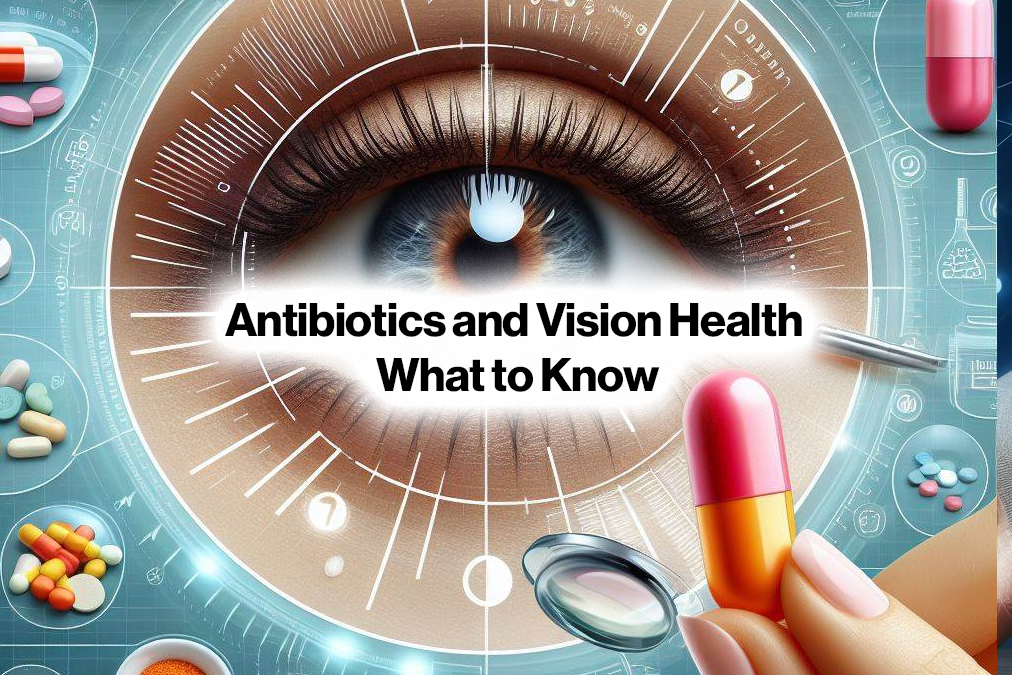In recent years, the relationship between antibiotics and vision health has garnered significant attention from both the medical community and the general public. As we delve into the intricate connection between these two seemingly disparate subjects, we uncover a wealth of information that sheds light on the impact of antibiotics on our eyesight. In this comprehensive article, we aim to provide a deep understanding of the relationship between antibiotics and vision health, addressing key concerns, potential risks, and essential considerations for maintaining optimal eye health.
The Intriguing Interplay: Antibiotics and Vision Health
Antibiotics, commonly known for their role in treating bacterial infections, have a multifaceted impact on our overall health. While their primary function is to combat infections and aid in the healing process, their use can also influence various bodily systems, including our vision health. This interplay arises from the delicate balance of microorganisms in our bodies, commonly referred to as the microbiome. This intricate ecosystem, present in various parts of the body including the eyes, plays a pivotal role in maintaining our health.
Antibiotics and Ocular Microbiome Disruption
The ocular microbiome, a collection of microorganisms residing on the surface of our eyes, contributes to the health and function of our visual system. However, the use of antibiotics, particularly when prescribed for systemic infections, can inadvertently disrupt this delicate balance. The eradication of both harmful and beneficial bacteria can lead to an imbalance in the ocular microbiome, potentially giving rise to various ocular issues.
Potential Risks and Concerns
1. Dry Eye Syndrome
One of the most commonly reported side effects of antibiotics pertains to the development of dry eye syndrome. The disruption of the ocular microbiome can compromise the production of tears and the overall lubrication of the eyes. This can result in discomfort, redness, and a gritty sensation, significantly impacting the quality of one’s vision.
2. Increased Susceptibility to Infections
Paradoxically, while antibiotics are used to combat infections, their overuse can weaken the immune response in the long term. This can potentially render the eyes more susceptible to infections, including conjunctivitis and keratitis, which can lead to discomfort and visual impairment.
3. Altered Corneal Health
The cornea, a transparent layer covering the front of the eye, plays a vital role in focusing light onto the retina. Antibiotic use has been linked to corneal irregularities, potentially affecting visual acuity and leading to conditions such as astigmatism.
Guidelines for Preserving Vision Health During Antibiotic Use
While antibiotics play a crucial role in combating infections, it’s essential to prioritize vision health during their use. To mitigate the potential risks associated with antibiotic-related ocular issues, consider the following guidelines:
1. Consultation and Communication
Prior to initiating antibiotic treatment, consult with a qualified healthcare professional. Discuss your medical history, any pre-existing ocular conditions, and potential side effects related to antibiotic use.
2. Probiotic Supplementation
In some cases, healthcare providers may recommend probiotic supplementation during antibiotic therapy. Probiotics can help restore the balance of beneficial bacteria in the body, including the ocular microbiome.
3. Lubricating Eye Drops
To counteract the effects of dry eye syndrome, consider using preservative-free lubricating eye drops. These drops can provide relief from discomfort and help maintain adequate tear production.
4. Follow Prescribed Dosages
Adhering to the prescribed antibiotic dosage and completing the entire course of treatment is crucial. Abruptly stopping antibiotics or altering the dosage can contribute to antibiotic resistance and other complications.
5. Regular Eye Examinations
Maintain a schedule of regular eye examinations, especially if you are on prolonged antibiotic therapy. An optometrist or ophthalmologist can monitor your ocular health and address any emerging issues promptly.
In Conclusion
As we navigate the realm of antibiotics and vision health, it becomes evident that there is a complex interplay between these two subjects. While antibiotics are undeniably valuable in treating infections, their impact on the ocular microbiome and subsequent effects on vision health cannot be overlooked. By understanding the potential risks and adopting proactive measures to preserve ocular well-being during antibiotic use, individuals can mitigate the potential side effects and continue to enjoy clear and comfortable vision.

Leave a Reply